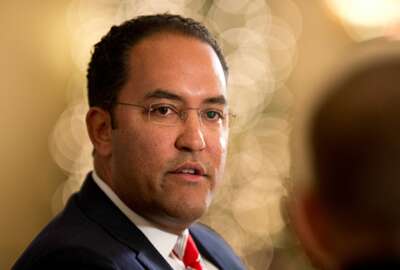

After the Modernizing Government Technology Act fell short in the 114th Congress, lawmakers and industry officials have high expectations for the bill this session.
Rep. Will Hurd (R-Texas) is back at the helm of the Oversight and Government Reform Subcommittee on IT for the 115th session of Congress. This means he again will have his pulpit to try again to address federal legacy technology systems.
Hurd is working on an updated version of the Modernizing Government Technology (MGT) Act, which the House passed in December, but a $9 billion score by the Congressional Budget Office (CBO) and a short schedule doomed the bill in the Senate.
Both House and Senate staff members say a fix to the bill to address the CBO score is in the works and could be completed in the coming weeks.
“I look forward to working with Congressman Hurd to achieve passage of the Modernizing Government Technology Act in the 115th Congress. This critical piece of legislation continues to be a priority for me this year,” said Rep. Gerry Connolly (D-Va.), ranking member of the subcommittee on Government Operations, in an email to Federal News Radio. “We have been working with industry experts and the Congressional Budget Office to clarify the intent and actual costs of the legislation. However, I hope the new administration will be open to making investments in federal IT modernization, at least, for the sake of cybersecurity.”
A Senate aide said they are evaluating what the best approach is to move the MGT Act forward.
“We think we have a fix for the CBO score,” said the aide, who requested anonymity to talk about the work on the updated bill. “We are super optimistic on this topic area. There isn’t really any opposition from industry. There can be shades of interest at different levels depending on the topics and approach. But I think there is widespread agreement that we face massive challenges, we could be doing a lot better and making improvements. When you add in heightened concerns about cyber, I’m most optimistic we will make progress among many technology issues.”
The aide said the MGT Act is the third prong in a multi-faceted effort.
The source said the passing of the Federal IT Acquisition Reform Act (FITARA) into law, and conducting oversight and influencing budget decisions are the other two tactics in play.
“We are trying to push as much as we can through all levers we have,” the aide said. “We are looking at what requires legislation, what are the real barriers and the challenges we’ve identified. We are open to removing them. There is a strong appetite on these issues. It’s bipartisan and bicameral, and we are advancing issues in pragmatic ways. I think there is keen interest in making progress.”
Hill staff continues to reach out to industry. There were two separate industry get-togethers in the last few weeks. One was an informal happy hour arranged by Senate staff, and the other was a listening session arranged by Hurd’s staff.
Pam Walker, a senior director for Federal Public Sector Technology at the Information Technology Alliance for Public Sector (ITAPS), said the support from MGT remains strong.
Walker, who attended the listening sessions arranged by Hurd’s staff, said the main discussion was how to get the bill to the finish line and bring down the CBO score.
“With a new Congress, they wanted to see if there was any new ideas,” she said. “We are preparing if MGT moves or if another version goes forward. We will go to the Hill and educate new members to tell them why this bill is a top priority.”
Walker said she isn’t hearing any specific changes or new concerns about MGT, but the House and Senate committee staff are open to whatever would move the bill forward.
At least one of the nominees of President Donald Trump have expressed their understanding of the need for IT modernization.
Commerce Department nominee Wilbur Ross wrote in his answers to questions for the record that he is committed to working with the agency’s CIO and the budget office to accelerate savings from FITARA and maintaining their “A” grades on data center consolidation and risk assessment initiatives.
“In general, I believe that the CIO should be intimately involved with such initiatives, and, through the shared services agreement in place that consolidates the department’s purchasing power, the CIO will have an even more important role,” Ross wrote. “The CFO/ASA, CIO and Chief Human Capital Officer all report directly to the Secretary. If confirmed, I will certainly enforce this practice as a good working relationship and communication among senior officers is the key to organizational effectiveness.”
Ross also committed to making the review of Commerce’s ongoing, 10-year facilities upgrade that includes the IT infrastructure effort as one of his first priorities.
Elaine Chao, the Transportation Department nominee, was not familiar with FITARA, its requirements or any of the agency’s IT initiatives or challenges. Chao promised to get up to speed quickly, however.
Return to the Reporter’s Notebook
Copyright © 2025 Federal News Network. All rights reserved. This website is not intended for users located within the European Economic Area.
Jason Miller is executive editor of Federal News Network and directs news coverage on the people, policy and programs of the federal government.
Follow @jmillerWFED


